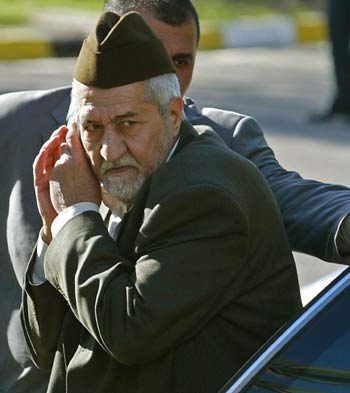
Iraqi Arab Sunni politician Adnan al-Dulaimi arrives for a meeting with Iraqi politicians in Baghdad (AFP)
BAGHDAD, Iraq, AP – An armed group created with government backing to drive al-Qaeda fighters out of a restive Iraqi province claimed Monday that it had killed five top members of the terror group.
The claim came in a statement posted on an Islamic Web site and attributed to the Anbar Revenge Brigade, recently formed by tribal leaders of the western Anbar province.
“Your brothers, heroes of the Revenge Brigade, carried out the killing of five important elements of al-Qaeda group, avenging the death of the sons of our Ramadi city,” the statement said.
It listed the names of four alleged al-Qaeda leaders. The fifth man, it said, was from Ansar al-Sunnah, a terrorist group affiliated with al-Qaeda.
The claim was the first Internet posting by the Anbar Revenge Brigades and could not be independently verified.
Iraq’s insurgents, including al-Qaeda fighters, routinely use the Internet to claim responsibility for attacks or to publicize their ideology.
Tribal and religious leaders, former officers of Saddam Hussein’s army as well as hundreds of Anbar residents met last November in the provincial capital of Ramadi with U.S. military commanders to discuss means to speed up a U.S. withdrawal from the city.
News of the meeting appeared to have prompted a spate of killings targeting Iraqis who participated in the talks with the Americans as well as local figures who had urged the province’s mostly Sunni residents to vote in the U.S.-backed parliamentary elections on Dec. 15.
Several top clerics and a tribal leader were killed. The deadliest attack — a suicide bombing Jan. 5 among a line of police recruits in Ramadi — killed at least 58, including U.S. troops.
The killings turned tribal leaders against followers of Abu Musab al-Zarqawi, the Jordanian-born leader of al-Qaeda in Iraq, and the group has since claimed to have killed or detained hundreds of them.

Iraqi residents look at burning debris at market after series of bomb attacks in Baghdad’s Sad’r City (R)

Iraqi soldiers point their guns gun on a defamed painting of ousted Iraqi dictator Saddam Hussein in the southern city of Basra (AFP)

Iraqi Arab Sunni politician Adnan al-Dulaimi arrives for a meeting with Iraqi politicians in Baghdad (AFP)
